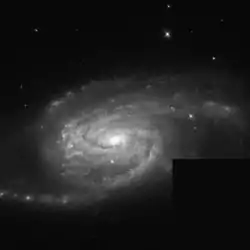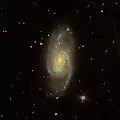| NGC 6181 | |
|---|---|
 NGC 6181 as seen through the Hubble Space Telescope | |
| Observation data (J2000 epoch) | |
| Constellation | Hercules |
| Right ascension | 16h 32m 20.9s |
| Declination | +19° 49′ 36″ |
| Redshift | 0.007922±0.000013 |
| Heliocentric radial velocity | 2375±4 km/s |
| Galactocentric velocity | 2493±6 km/s |
| Apparent magnitude (V) | 10.42 |
| Absolute magnitude (V) | -22.14 |
| Characteristics | |
| Type | SB(rs)c |
| Size | ~ 79,000 light years |
| Apparent size (V) | 2.50′ × 1.1′ |
| Other designations | |
| UGC 10439, MCG 3-42-20, ZWG 109.31, PGC 58470, IRAS 16301+1955 | |
References: NASA/IPAC extragalactic datatbase, http://spider.seds.org/, http://cseligman.com | |
NGC 6181 is a barred spiral galaxy located in the constellation Hercules. It is designated as SB(rs)c in the galaxy morphological classification scheme and was discovered by William Herschel on 28 April 1788. The galaxy is 107 million light years away.[1][2][3]
Two supernovae have been observed in NGC 6181: SN 1926B (type unknown, mag. 14.8),[4][5] and SN 1951I (type unknown, mag. 15.7).[6]
See also
Gallery
 NGC 6181 by the Sloan Digital Sky Survey
NGC 6181 by the Sloan Digital Sky Survey
References
- ↑ "Object No. 1 - NGC 6181". NASA/IPAC extragalactic database. NASA/IPAC. Retrieved 3 October 2015.
- ↑ "Revised NGC Data for NGC 6081". Seds. Retrieved 3 October 2015.
- ↑ "NGC 6181 (= PGC 57684)". cseligman. Retrieved 3 October 2015.
- ↑ Transient Name Server entry for SN 1926B. Retrieved 28 March 2023.
- ↑ Central Bureau for Astronomical Telegrams list of Supernovae. Retrieved 28 March 2023.
- ↑ Transient Name Server entry for SN 1951I. Retrieved 25 March 2023.
External links
 Media related to NGC 6181 at Wikimedia Commons
Media related to NGC 6181 at Wikimedia Commons
This article is issued from Wikipedia. The text is licensed under Creative Commons - Attribution - Sharealike. Additional terms may apply for the media files.